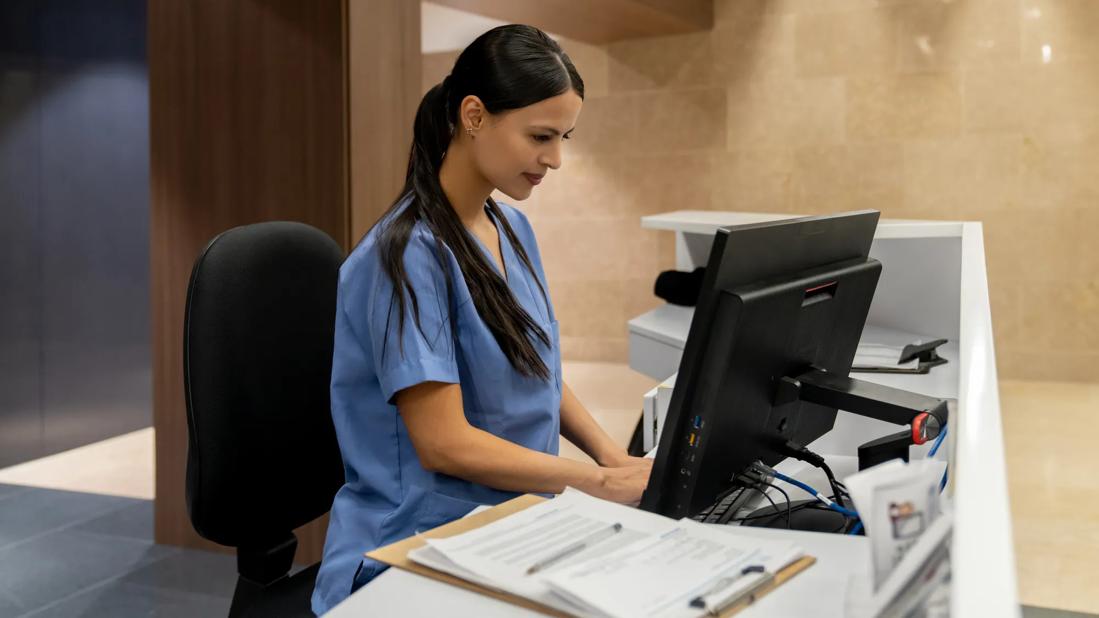This technical solution expedites the patient’s ED to admissions process

Image content: This image is available to view online.
View image online (https://assets.clevelandclinic.org/transform/a729383e-7382-49e9-829d-659519daad3a/1213902657)
Nurse on computer
With nearly 140 million Emergency Department (ED) visits every year across the U.S., faster ED throughput leads to better quality of care for patients being admitted to the hospital and subsequent ED arrivals.
Advertisement
Cleveland Clinic is a non-profit academic medical center. Advertising on our site helps support our mission. We do not endorse non-Cleveland Clinic products or services. Policy
The nurse handoff process is a potential factor contributing to prolonged ED delays. This crucial workflow entails the ED nurse calling the inpatient nurse to review the patient’s status prior to accepting the patient for admission.
“Connecting with the inpatient nurse can involve several phone calls. It may take a few attempts to reach the appropriate nurse and share important findings and test results,” says Josephine Amberpeta, BSN-RN, an ED clinical analyst within Cleveland Clinic’s Information Technology Division.
Amberpeta explains, “Finding the relevant information in the patient’s electronic health record (EHR) adds to the complexity. The ED nurse is often clicking into a dozen different places within the chart just to locate the details.”
Previously an ED nurse, Amberpeta leaned on her clinical background to build an electronic tool to replace the existing workflow.
“Blending my clinical experiences with informatics helped structure our existing technology into a detailed handoff tool.” She adds, “I partnered with ED nurse leaders to identify the ‘must have’ components and modeled the tool after the standard nursing SBAR (situation, background, assessment, recommendation) report.”
To access real-time and historical data, Amberpeta’s build pulled existing components into a thorough report that displays the patient’s information by descending relevance.
“The placement of each component on the report correlates with pertinent patient information to support the continuum of care,” says Amberpeta. “The report captures all the patient’s care from ED arrival to admission.”
Advertisement
ED nurses click on the ‘Write Handoff’ link to complete their portion of the report. From there, the inpatient nurse can quickly access imaging and lab results as well as medication administration information.
“With intuitive icons, nurses can quickly view any abnormalities without having to click through the patient’s EHR.” Amberpeta adds, “Having the same view of the report allows ED and inpatient nurses to access the same real-time information and sign-off on their portion of the handoff.”
A green check displays for the inpatient nurse when the ED handoff report is ready for review. The inpatient nurse clicks into the chart to review and complete the inpatient handoff portion. At this point, the inpatient nurse can raise questions or approve the handoff report to admit the patient. A two-person icon displays when both nurses agree that the patient can safely move from the ED to the floor.
Amberpeta describes the building process as an iterative, phased approach based on ED nurses’ feedback and her team’s guidance.
“Successful adoption of technical solutions signals effectiveness,” says Amberpeta. “To do this, I created an ED Informatics Nursing committee to demo new functionality. Attendance is voluntary and includes ED managers and bedside nurses. Incorporating their feedback into our design build includes them in the development process and enhances their willingness to use the tool.”
“The handoff report identifies issues that could have potentially been missed with the previous workflow,” Amberpeta adds. “The report gathers information that might have previously been overlooked, such as seizure precautions indicating that a different type of bed may be a better option than the one typically given to patients. This comprehensive view is a one-stop shop to support the next level of care.”
Advertisement
The handoff report is currently used at three Cleveland Clinic locations with enterprise-wide expansion expected this fall.
“Beyond the locations actively using the tool, all ED nurses have access to the handoff report and can use it to verbally describe the patient’s status to the inpatient nurse.” Amberpeta continues, “But expanding effective usage depends on operational leaders educating their teams and encouraging adoption.”
Nurses using the electronic report estimate a 15-minute decrease in the handoff workflow.
From Amberpeta’s perspective, “Harnessing technology to save time and close care gaps fosters our ongoing commitment to provide exceptional care within a fast-paced, complex environment. Keeping pace with advancing technology is essential to maintaining our excellence.”
Advertisement
Advertisement
Outpatient referral order connects care teams before patients’ ED arrival
Akron General and Union Hospital increase throughput and patient satisfaction by rethinking their approach to care
Remotely based physicians use telehealth technology to evaluate lower-acuity patients in the ED, express clinic or during an EMS response
Peer-to-peer videos offer creative solution to help patients while they wait
Regional organizations collaborate to address nurse faculty shortage
How wellness habits help nurses flourish
Planning continues with critical, patient-focused input from nursing teams
Strengthening care through targeted resources and frontline voices